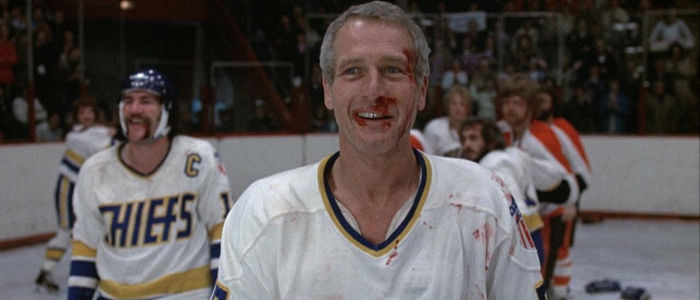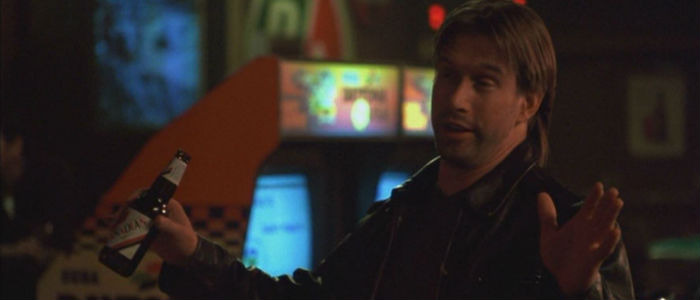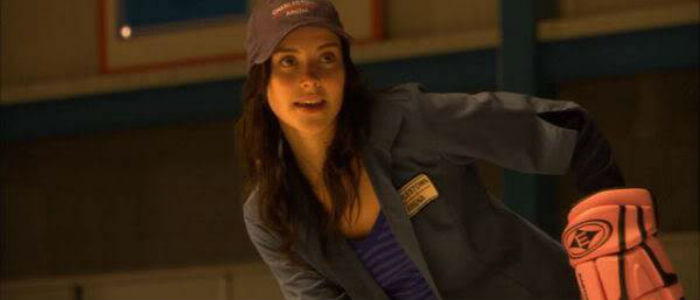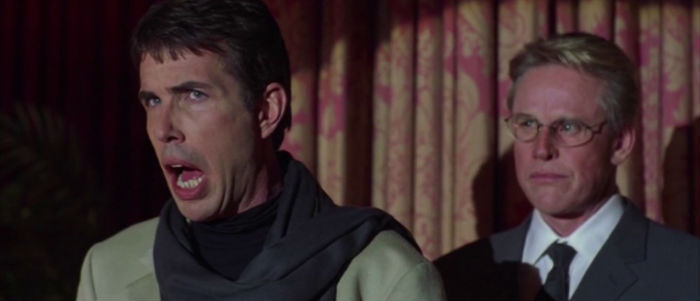'Slap Shot' Sequels Are 0 For 2
(Welcome to DTV Descent, a series that explores the weird and wild world of direct-to-video sequels to theatrically released movies. In this edition, we take a look at two belated sequels to a classic goon-filled sports movie from the 70s.)
I'm in Canada this week for a film festival, so when it came time to pick a DTV sequel to cover the only real choice was something Canadian. And what's more Canadian than hockey? That's not rhetorical, I really don't know. I'm a tennis guy — it's the only sport I can stomach playing or watching — so sports movies aren't typically my scene, but there are plenty that deliver the goods alongside their on-the-field/court/rink antics. One example? 1977's Slap Shot.
The film is ridiculously funny and even more crass, and while it wasn't a big hit in theaters it's only grown in cult-classic status in the decades since. Twenty-five years after its premiere the brain trust at Universal Pictures Home Entertainment decided it could be milked for some quick straight-to-DVD dollars and released two DTV sequels. The first is an attempt to ape the original's R-rated fun, and the second? A PG-rated teen movie. That's PG. It's not even PG-13. Have the suits at Universal even seen Slap Shot?! Madness.
Keep reading for a look at Slap Shot 2: Breaking the Ice (2002) and Slap Shot 3: The Junior League (2008).
The Beginning
Charlestown, PA is a working-class town on the verge of collapse. The mill which employs thousands of locals is set to close, and that in turn threatens the livelihood of the town's minor league hockey team the Chiefs who are the most foul-mouthed ice skaters you're likely to meet this side of Brian Boitano. The team is already running ragged, and with no hope on the horizon team captain Reggie Dunlop discovers a secret weapon in three new players. The Hanson Brothers are a violent trio who embrace the sport's bloodiest aspects, and the crowds grow to love it. Rumors that the team is being sold begin to swirl, and attendance is on the rise as the violence increases, but when Dunlop discovers the owner is actually going to disband the team as a tax write-off he decides they should drop the gladiator on ice act and play some good old-fashioned hockey for their championship game. That doesn't last, though, as their opponents have adopted their own brutal tactics leading Dunlop and friends with no other option but to bring the heat too.
The DTV Plot
Slap Shot 2: Breaking the Ice sees the Chiefs returned to their old ways as utter failures derided by opponents and fans alike. The Hanson Brothers are still fighting, the team is still losing, and captain Sean Linden is angered to learn they've been newly sold to a conglomerate with very particular plans. They leave Pennsylvania behind for the less populated landscape of Nebraska and find higher pay in the process. The only catch? They're set to play in scripted games "written" to accentuate the entertainment value of a Harlem Globetrotters-like experience on the ice. Oh, and they're saddled with a female coach. Say what?! The guys react as you'd expect, but when he's offered an out if he gets the others onboard Sean rolls over. Will he find his integrity before the season ends... and will anybody care? (They will not.)Slap Shot 3: The Junior League is essentially Slap Shot 2 meets D3: The Mighty Ducks.
Talent Shift
Slap Shot is an acknowledged classic of sports cinema — of the R-rated variety along the lines of The Longest Yard (1974) and Major League (1989) — and for all of its beautifully crafted and delivered crass humor it might surprise you to learn it was written by Nancy Dowd. Her names' sadly not as well-recognized as it should be, and that's partly due to her working as an uncredited writer (or under male pseudonyms) on films like Ordinary People (1980), Swing Shift (1984), and Cloak & Dagger (1984). Director George Roy Hill's career, meanwhile, may have ended with Funny Farm (1988), but you can't argue with the rest of his filmography including Butch Cassidy and the Sundance Kid (1969), The Sting (1973), The World According to Garp (1982), and more. The onscreen talent is equally strong starting with its lead star, Paul Newman. He's always been an actor who embraces the earthiness of his characters, but his performance here is just constantly entertaining as he lets loose with colorful language and wildly inappropriate behaviors. He's joined by a stellar supporting cast of familiar of faces including Melinda Dillon, Paul Dooley, Swoosie Kurtz, Strother Martin, Michael Ontkean, and M. Emmet Walsh.
Can you officially measure the drop in quality from a Paul Newman to a Stephen Baldwin? Doubtful, but I feel confident guesstimating the drop down to Breaking the Ice as a very, very big fall. Callum Keith Rennie is probably the highlight, and both David Hemmings and Gary Busey have small roles with the former only shot in shadows for some reason. The drop's even bigger to The Junior League as the only truly familiar face (outside of the returning Hanson Brothers) is a cameo by Leslie Nielsen. The behind the scenes talents on both films are even less notable with their highs including 2nd Unit Director work on Mystery, Alaska and Battlefield Earth.
How the Sequels Respect the Original
Well, they're both about hockey.
How the Sequels Shit on the Original
Slap Shot's characters are a foul bunch of guys and gals, and the dialogue is fittingly crass, dirty, and decidedly non-politically correct. It's a product of its times to be sure, but it's also funny as hell as for better or worse there's a sense of authenticity to their vocabulary and actions. Derogatory terms fly faster and higher than the pucks (this is a sports reference of some sort), but they're made so casually as to feel harmless in their intent. To be clear, effect and intent aren't always the same, but the language is used interchangeably with insults more acceptable to modern audiences making it feel more dated than cruel.
The first sequel doesn't have the excuse of "the times" and instead takes a different tact. Rather than toss around the terms themselves, it digs in with actual insults based around the idea of effeminate men being a negative. A choreographer is played with a "hilarious" flamboyance, and the language feels mean-spirited. That weak attempt at copying the original continues with the characters and plot. The former never feel real or lived-in, and the latter veers so close to the first film that it features the exact same change of heart at the end from violence to non-violence and back to violence again. It lacks anything as charming and effective as the Ontkean's on-the-ice striptease though.
The Junior League is the odd man out due mostly to its shift away from R-rated hijinx and language, but the entire dynamic is changed as well. Rather than be a rough and tumble team playing for respect a love of the game the kids here are lovable orphans who have to win the championship — requiring them to first form a team — in the hopes of convincing the town to vote in favor of them staying together. An evil land developer is the villain here, the Hanson Brothers have turned their back on the game and have instead started a motivational program focused on zen, and the teen Chiefs even let a girl (gasp!) play during the championship. That last bit is the only element that really works as it feels like the first fresh act of subversion in either sequel, but it comes far too late to be of any real interest here. Instead of the first film's flawed characters, we're given freaking orphans. Orphans can't be antiheroes! There's no dramatic tension to be found in rooting for orphans — who doesn't want orphans to succeed?! Besides the evil land developer I mean.
Conclusion
Universal Pictures is responsible for more DTV sequels than any other home video label, and while the quality ranges from the relative highs of Hard Target 2 and Cult of Chucky to the painful lows of The Hitcher II: I've Been Waiting and Death Race: Beyond Anarchy the odds generally aren't good when you see their logo appear on the screen. These Slap Shot sequels aren't about to change that opinion.




